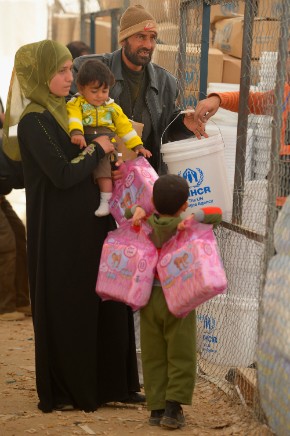Refugee crisis

In November a third American was beheaded by the so-called Islamic State of Iraq and Syria, which has taken control of parts of those two countries. Peter Kassig was captured in Syria, where he was working as a volunteer medical assistant, trying to address what a top United Nations official has called “the biggest humanitarian emergency of our era.”
According to the Office of the United Nations High Commissioner for Refugees, as many as 13.6 million people have been displaced by the conflict in Iraq and by civil war in Syria. Over 3 million Syrian refugees are now encamped in the neighboring countries of Jordan, Lebanon, and Turkey. Nearly 2 million Iraqis have been displaced this year.
Read our latest issue or browse back issues.
The refugees put a huge burden on their host countries. Lebanon, a country of 4 million, has over 1 million registered refugees. With winter approaching, these refugees face bleak prospects. Their plight is exacerbated, the UNHCR claims, by an underfunded relief effort, which faces a shortfall of $58 million. The charity Oxfam charges the United States with negligence in supporting refugee efforts, claiming that it has contributed only 60 percent of its fair share.
The United States and European countries have also been reluctant to accept refugees from Syria and Iraq. The surge in anti-immigrant sentiment in Europe has made those who move there feel unwelcome. Some refugees have decided to take their chances and move back to Syria. “I realized that I was only regarded and treated as a human being where I come from,” said a Syrian Christian who moved his family back to Syria from the Netherlands.
What can American Christians do? We can encourage our government to increase direct aid to the refugees and to support the refugee work of the host countries. We can push our government to open its doors to more displaced peoples from Iraq and Syria. We can support nongovernmental agencies that are working to meet human needs.
As for addressing the deep issues that are shaping the conflicts, the United States is severely limited. Military intervention by Western nations would likely have only a marginal impact, and Americans are rightly suspicious of undertaking the kind of financial and military investment that was made in Iraq.
Joshua Landis, a Syria expert at the University of Oklahoma, observes that a great and bloody “sorting out” process is taking place among ethnic and religious groups in the region, especially among Sunni and Shi‘a Muslims. He compares it to a process that took place in Eastern Europe in the mid-20th century. Landis foresees the eventual emergence of new nations that are more religiously and ethnically homogenous. In this situation, the United States must work with other nations to try to contain the conflict and to address the needs of displaced peoples.






